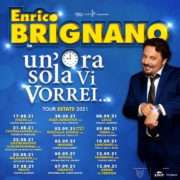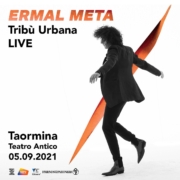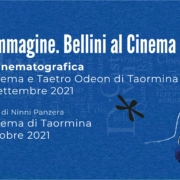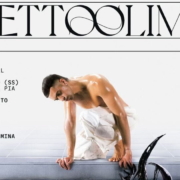Film Festival “Dolente Immagine”
A cycle of screenings dedicated to Vincenzo Bellini, the great Sicilian composer who lived in the early 1800s
Odeon Theatre (Via Teatrino Greco) and Casa del Cinema (Corso Umberto 61), September 4-23, 2021
FREE ENTRANCE but registration needed at
– http://reg.spendingvbk.it/ProgrammaBellini.html
– QRcode on the manifesto
– Mobile/WhatsApp 0039 3917462146 (10.00am-1.00pm and 5.00-8.00pm)
GREEN PASS REQUIRED

Film Festival “Dolente Immagine” 2021
CASA DEL CINEMA
Corso Umberto n. 61 – Opening hours: 10.00 am – 8.00 pm
Permanent exhibition “Dolente Immagine” till October 31st 2021
Video: https://www.facebook.com/fondazionetaorminartesicilia/videos/541505000413191
CASA DEL CINEMA, 8.30 pm – The films
Saturday 4
Casta Diva (ITA, 1954 – 98′) by Carmine Gallone, with Antonella Lualdi, Nadia Grey and Maurice Ronet
Sunday 5
Casta Diva (ITA, 1935 – 95′) by Carmine Gallone, with Martha Eggerth, Sandro Palmieri
ODEON THEATRE, 8.30 pm – Operas at the Cinema
Monday 6 > Projection of “Norma”
Opera in two acts by Vincenzo Bellini. Recorded at the Teatro Massimo “Vincenzo Bellini” of Catania in 2005
Tuesday 7 > Projection of “La Straniera”
Opera in two acts by Vincenzo Bellini. Recorded t the Teatro Massimo “Vincenzo Bellini” of Catania in 2017.
Direction: Andrea Cigni, Maestro: Sebastiano Rolli
More info: https://en.wikipedia.org/wiki/La_straniera
Wednesday 8 > Projection of “I Capuleti e i Montecchi”
Thursday 9 > Projection of “La Sonnambula”
Saturday 11 > projection of “Beatrice di Tenda”
Sunday 12 > projection of “I Puritani”
ODEON THEATRE, 6.30 pm – The films
Tuesday 14
Callas Forever (ITA 2002, 111′) by Franco Zefirelli, with Fanny Ardant, Jeromy Irons
A 2002 biographical film, an homage to Zeffirelli’s friend, internationally acclaimed opera diva Maria Callas, whom he directed on stage in Norma, La traviata, and Tosca. It was his last film before his death in 2019.
More info: https://en.wikipedia.org/wiki/Callas_Forever
Wednesday 15
La Sonnambula (ITA 1952, 85′) by Cesare Barlacchi, with Gino Sirimberghi, Franca Tamantini
Thursday 16
Casta Diva (ITA, 1954 – 98′) by Carmine Gallone, with Antonella Lualdi, Nadia Grey and Maurice Ronet
Friday 15
Casa Ricordi (ITA 1954, 11a’) by Carmine Gallone with Paola Stoppa, Maurice Ronet, Fosco Giachetti
The story of the family Ricordi
Saturday 18
Fitzcarraldo (GER 1982, 158′) by Werner Herzog, with Klaus Kinsky, Claudia Cardinale
The story of Brian Sweeney Fitgerald, an extremely determined man who intends to build an opera house in the middle of the Amazon rainforest.
More info: https://en.wikipedia.org/wiki/Fitzcarraldo
Sunday 19
Maria by Callas (FRA 2017, 113′) by Tom Volf. A documentary with Maria Callas
A documentary film about the life and career of opera singer Maria Callas. Told through performances, TV interviews, home movies, family photographs, private letters and unpublished memoirs—nearly all of which have never been shown to the public—the film reveals the essence of an extraordinary woman who rose from humble beginnings in New York City to become a glamorous international superstar and one of the greatest artists of all time. Her letters and unpublished memoirs are read by opera singer Joyce DiDonato.
CASA DEL CINEMA
Tuesday 21, 6.30 pm
Casta Diva (ITA, 1935 – 95′) by Carmine Gallone, with Martha Eggerth, Sandro Palmieri
Tuesday 21, 8.30 pm
The Divine Spark (UK 1935, 95′) by Carmine Gallone, with Martha Eggerth, Philip Holmes. Original version
Wednesday 22, 8.30 pm
Norma (ITA 1911, 11′)
followed by
Norma (ITA 2005, 120′) by Boris Airapetian, with Hasmik Papian, Gegam Grigorian
Thursday 23, 5.00 pm
5.00 pm > Vincenzo Bellini in the film history. Meeting with Franco La Magna
6.00 pm > Norma (ITA 1911, 11′)
6.30 pm > Casta Diva (ITA, 1935 – 95′) by Carmine Gallone, with Martha Eggerth, Sandro Palmieri
8.30 pm > The Divine Spark (UK 1935, 95′) by Carmine Gallone, with Martha Eggerth, Philip Holmes. Original version
10.30 pm > Casta Diva (ITA, 1954 – 98′) by Carmine Gallone, with Antonella Lualdi, Nadia Grey and Maurice Ronet
MORE INFO
Vincenzo Bellini (Catania 1801 – Puteaux 1835)
Fondazione Taormina Arte > www.taormina-arte.com – www.facebook.com/fondazionetaorminartesicilia
WHERE TO STAY
Hotel La Pensione Svizzera – Hotel Villa Schuler – Hotel Villa Ducale – Hotel Villa Carlotta
















